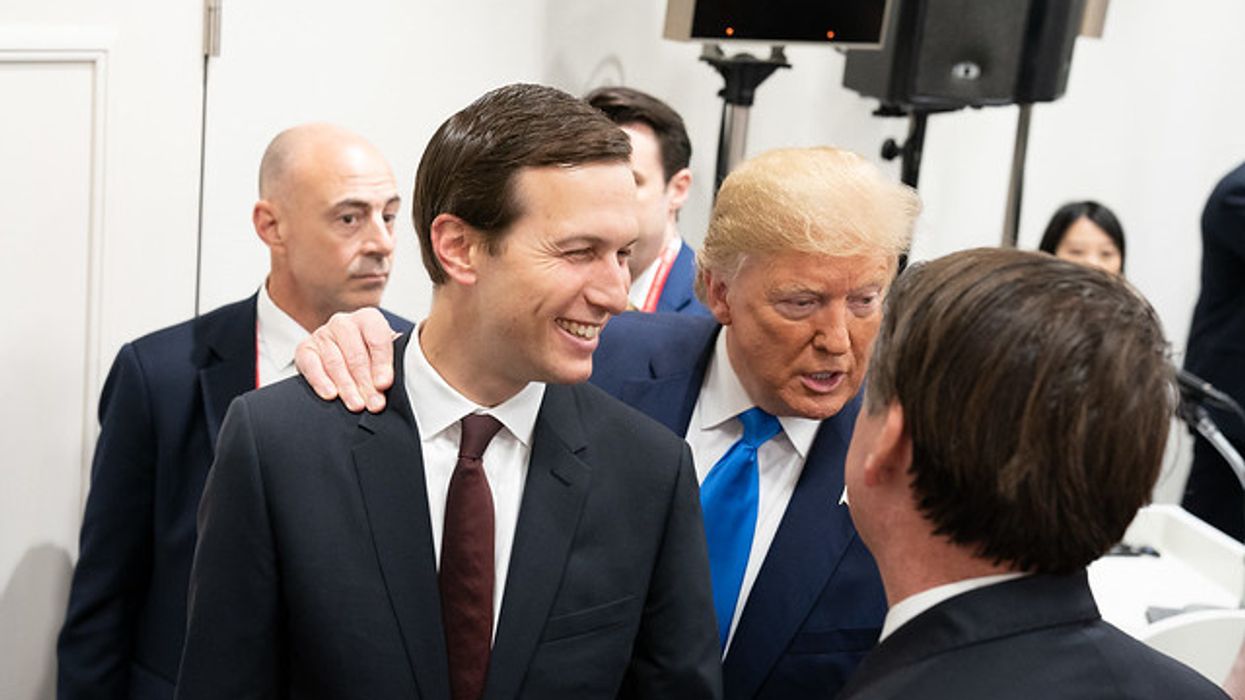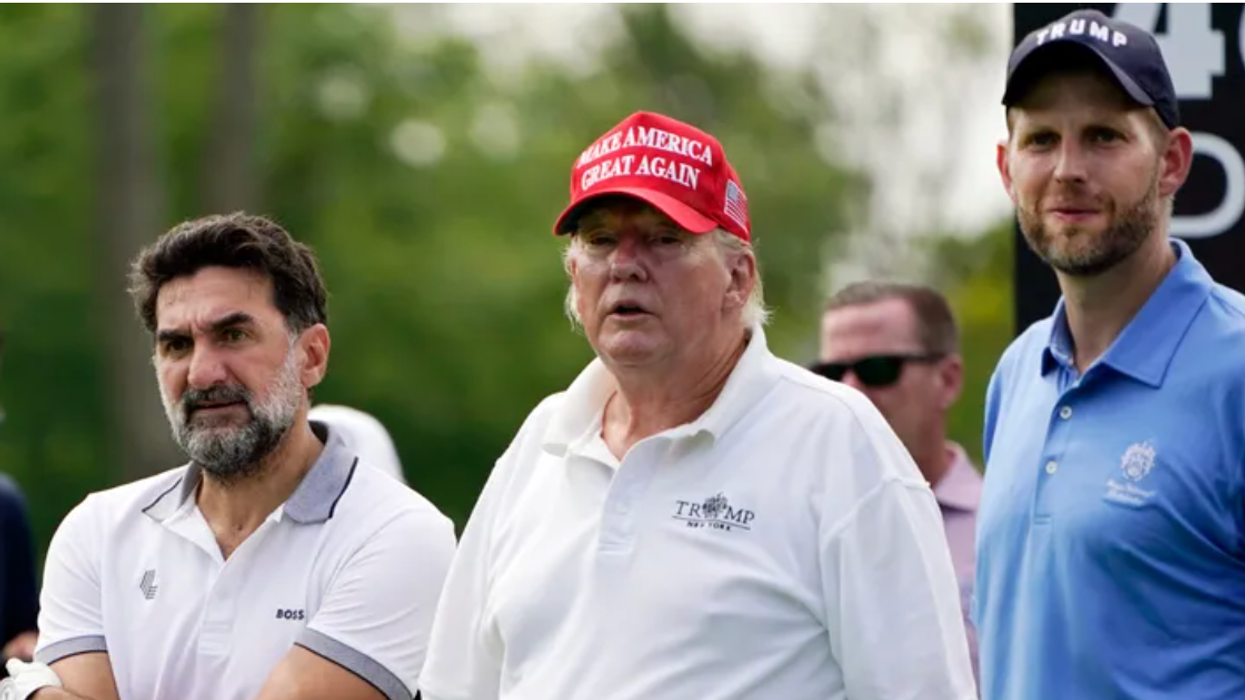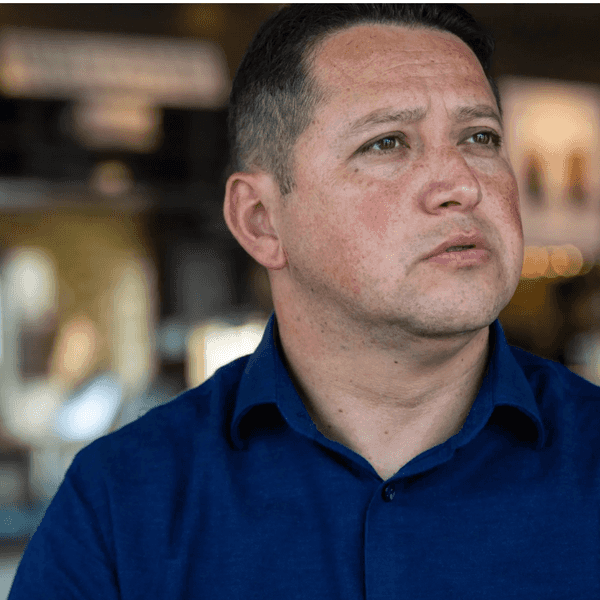This week's spectacle is an easy outing. You don't even need to walk behind the greasy tent to see this Freakshow. Just plop down on a golf cart. Enjoy the manicured grassy knolls. Inhale the green smell of money.
Now, get out your binoculars. Observe sunscreen-slathered, perspiring American men dancing with swords over by the sand trap.
The news that the red, white, and blue PGA is joining Saudi Arabia's LIV golf league was reported with the same awe that one might expect of a cratering asteroid hit. The merger "shocked" the sports world. It got more attention than the blown Ukrainian dam that now threatens Europe's largest nuclear power plant. As a headline, it was barely supplanted by the East Coast smoke-ocalypse.
But should we be shocked?
Golf courses are little freak shows of networked white guys who build shopping malls and don't read many books. The Former Guy, paunchy, rich, entitled, is the avatar of the sport. To afford the toys and the greens, most must rank in the above $75,000 annual income range, usually much, much higher. They're the MAGA donor/voter sweet spot.
The PGA-LIV merger is about something bigger than the hypocrisy of the golf pros, bigger than whatever politics and deals lesser men discuss between holes.
The capitulation of this American pro sport is just another example of our culture's total abjection to concentrated wealth. The Saudi royals control a $700 million sovereign wealth fund called the Public Investment Fund, or PIF. At least a trillion dollars, is parked in an Abu Dhabi sovereign wealth fund under the control of a few descendants of desert tribal leaders whose forebears couldn't read just a generation ago.
For comparison, Apple is valued at a trillion dollars.
The Gulf fortunes are dirty money drilled out of the desert in the form of climate-destroying fossil fuel. When a small group of people controls that much money, the source no longer matters, and the owners can literally do anything. They can torture and kill a journalist in front of the whole world. They can starve Yemeni babies to death and bomb the hell out of an ancient city on TV, and no one will do a damn thing.
The takeover of American golf is just one strategic move in a larger game of washing the human rights stain away. Sport-washing. Art-washing. Green-washing, Tech-washing, and fempowerment-washing.
Sometimes these ops look too risible to take seriously. The United Arab Emirates, where royal princesses are locked up like medieval Rapunzels, has a "Dubai Women Establishment," led by various female members of the royal clan. In its literature, this body notes that women in Dubai can vote, that there are women in the government, and an all-female police force is being created.
These feints do get taken seriously, as oceans of cash erase laughter, critics, truth-tellers, memory, even satire. Those who persists in pointing at the emperor's new clothes can go to the dungeon for a long time.
Before we get to that, though, let's remember that American sports corruption is nothing new. Besides the epic sexual harassment and abuse of women that goes like apple pie with pro ball, billionaire team owners regularly fleece the American taxpayer. Who pays for the new stadiums planted like shiny spaceships from Planet Money in neighborhoods with crumbling schools, no grocery stores, gun violence, squalor?
We bought them.
Since 2000, American taxpayers have blown $4.3 billion to build professional sports stadiums and arenas. When they come to the trough, team owners and their lackeys always argue that new stadiums will provide economic growth for a city. Economists and urban planners disagree. After a season of NFL and Washington football team deflecting sexual harassment complaints, Reps. Earl Blumenauer (D-OR), Jackie Speier (D-CA), and Don Beyer (D-VA) reintroduced a bill titled the "No Tax Subsidies for Stadiums Act" that would turn off the spigot, effective immediately upon enactment.
The bill has not been considered, let alone enacted. Expect an asteroid hit before that happens.
Back to Gulf golf.
Pro golfers who resisted the LIV's king's-ransom contracts (golfer Phil Mickelson, for example, signed for $200 million—an offer any of us might have had a hard time turning down) very rightly called out the country's abysmal human rights record.
The resisters were, of course, thinking of the very public torture/murder of journalist Jamal Khashoggi. Saudi henchmen chopped off his fingers before strangling him , burning his body, and washing the ashes down a drain in the lamb barbecue pit at the Saudi consulate in Istanbul.
That is probably all the evidence we need regarding the limitless impunity the wealth fund enjoys. But the Kingdom's dungeons are populated with men and women whose names you have never heard of, whose only crime is speech. Last year, a Saudi court sentenced a woman named Nourah bint Saeed al-Qahtani to 45 years in prison. A "Specialized Criminal Court convicted her of 'using the Internet to tear the [country's] social fabric' and 'violating the public order by using social media,' according to court documents. That sentence followed a 34-year sentence handed down to another woman for tweeting. "Only weeks after this month's shocking 34-year sentence of Salma al-Shehab, al-Qahtani's 45-year sentence, apparently for simply tweeting her opinions, shows how emboldened Saudi authorities feel to punish even the mildest criticism from its citizens," said Abdullah Alaoudh, Director of Research for the Gulf Region at Democracy for the Arab World Now (DAWN), at the time.
These autocracies steal people’s lives over mere tweets and blogged words. Jailed Saudi blogger Raif Badawi was released in 2021, after ten years and a disgusting public flogging. So was Saudi women's rights activist Loujain al Hathloul after being, according to her family, tortured while imprisoned for advocating for women's right to drive. Al Hathloul is now suing the Saudi government and some US intelligence operatives for an illegal spying operation paid for by the UAE. The UAE firm is called The Dark Matter Group. The name should trigger a global end-of-irony alert or be logged as further evidence that we have, as a species, wormholed ourselves into a parallel universe based on a Marvel comic book.
According to the Electronic Frontier Foundation, a San Francisco-based organization that advocates against surveillance and is handling Al Hathloul's case: "Al Hathloul is among the victims of an illegal spying program created and run by former U.S. intelligence operatives, including the three defendants named in the lawsuit, who worked for a U.S. company hired by the United Arab Emirates (UAE) in the wake of the Arab Spring protests to identify and monitor activists, journalists, rival foreign leaders, and perceived political enemies."
The hacking of Al Hathloul's phone was part of the UAE's widespread and systematic attack against human rights defenders, activists, and other perceived critics of the UAE and Saudi Arabia. According to her lawyers, the Emirati regime used information hacked from Hathloul's phone to arrest and extradite her to Saudi Arabia.
The Gulf royals' cybersurveillance addiction is well known. Eighteen human rights groups recently implored Microsoft to back out of a plan to build a regional cloud center in Saudi Arabia. “There is an enormous risk” that Saudi authorities may obtain access to data stored in Microsoft's cloud data center, thus posing unique and direct threats to human rights and privacy, the human rights groups said.
The leaders are keenly aware of what the West wants to see. The image of Saudi Arabia is stage-managed by the world's greatest masters of slick storytelling and high-end reputation enhancement, the dervishes of damage control. This sleight of hand is pulled off with vast sums of borderless wealth. Soon enough, people who spectate American golf will forget who owns it.
What does hundreds of billions or a trillion dollars in a single sovereign wealth fund controlled by a few buy besides golf? Bankers, engineering firms, architects, luxury realtors, movie stars, artists, white-shoe lawyers. Managers and "creatives" across the globe salivate for these cash deals. The hoard buys protectors who paper over a medieval system based on the bedrock principle that unregulated females will destroy the social fabric. If the possessors of that money do something untoward, legions of men and women at the world's biggest public relations and law firms in New York and Washington and London form a virtual phalanx around them.
Fore!
Nina Burleigh is a a journalist, author, documentary producer, and publisher of American Political Freakshow, a Substack on politics. Her journalism has been published in The New York Times, The New Yorker, Airmail, and New York. She is the author of seven books including most recently Virus: Vaccinations, the CDC, and the Hijacking of America's Response to the Pandemic and an adjunct professor at New York University's Arthur L. Carter Journalism Institute.
Please consider subscribing to American Political Freakshow, from which this is reprinted with permission.












